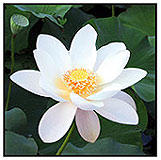
The Meaning of the Mantra
in Tibetan Buddhism
Overview
Tibetan Buddhists believe that saying the mantra
(prayer), Om Mani Padme Hum, out loud or silently to oneself, invokes the powerful
benevolent attention and blessings of Chenrezig, the embodiment of compassion.
Viewing the written form of the mantra is said to have the same effect -- it
is often carved into stones, like the one pictured above, and placed where people
can see them.
Spinning the written form of the mantra around in a Mani wheel (or prayer wheel)
is also believed to give the same benefit as saying the mantra, and Mani wheels,
small hand wheels and large wheels with millions of copies of the mantra inside,
are found everywhere in the lands influenced by Tibetan Buddhism.
It is said that all the teachings of the Buddha are contained in this mantra:
Om Mani Padme Hum can not really be translated into a simple phrase or sentence.
It is appropriate, though, to say a little about the mantra, so that people
who want to use it in their meditation practice will have some sense of what
they are doing, and people who are just curious will understand a little better
what the mantra is and why it is so important to Tibetan Buddhists. We begin
in the next section with some information about the mantra itself.
The Mantra Om Mani Padme Hum
The Mani mantra is the most widely used of all Buddhist
mantras, and open to anyone who feels inspired to practice it -- it does not
require prior initiation by a lama (meditation master).
The six syllables of the mantra, as it is often pronounced by Tibetans -- Om
Mani Padme Hum -- are here written in the Tibetan alphabet:
Reading from left to right the syllables are:
Om (ohm)
Ma (mah)
Ni (nee)
Pad (pahd)
Me (may)
Hum (hum)
The vowel in the sylable Hu (is pronounced as in the English word 'book'. The
final consonant in that syllable is often pronounced 'ng' as in 'song' -- Om
Mani Padme Hung. There is one further complication: The syllablePad is pronounced
Pe (peh) by many Tibetans: Om Mani Peme Hung.
The mantra originated in India; as it moved from India into Tibet, the pronunciation
changed because some of the sounds in the Indian Sanskrit language were hard
for Tibetans to pronounce.
The True Sound of Truth
An old story speaks about a similar problem. A devoted meditator, after years
concentrating on a particular mantra, had attained enough insight to begin teaching.
The student's humility was far from perfect, but the teachers at the monastery
were not worried.
A few years of successful teaching left the meditator with no thoughts about
learning from anyone; but upon hearing about a famous hermit living nearby,
the opportunity was too exciting to be passed up.
The hermit lived alone on an island at the middle of a lake, so the meditator
hired a man with a boat to row across to the island. The meditator was very
respectful of the old hermit. As they shared some tea made with herbs the meditator
asked him about his spiritual practice. The old man said he had no spiritual
practice, except for a mantra which he repeated all the time to himself. The
meditator was pleased: the hermit was using the same mantra he used himself
-- but when the hermit spoke the mantra aloud, the meditator was horrified!
"What's wrong?" asked the hermit.
"I don't know what to say. I'm afraid you've wasted your whole life! You
are pronouncing the mantra incorrectly!"
"Oh, Dear! That is terrible. How should I say it?"
The meditator gave the correct pronunciation, and the old hermit was very grateful,
asking to be left alone so he could get started right away. On the way back
across the lake the meditator, now confirmed as an accomplished teacher, was
pondering the sad fate of the hermit.
"It's so fortunate that I came along. At least he will have a little time
to practice correctly before he dies." Just then, the meditator noticed
that the boatman was looking quite shocked, and turned to see the hermit standing
respectfully on the water, next to the boat.
"Excuse me, please. I hate to bother you, but I've forgotten the correct
pronunciation again. Would you please repeat it for me?"
"You obviously don't need it," stammered the meditator; but the old
man persisted in his polite request until the meditator relented and told him
again the way he thought the mantra should be pronounced.
The old hermit was saying the mantra very carefully, slowly, over and over,
as he walked across the surface of the water back to the island.